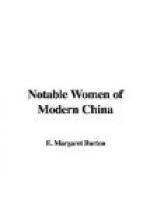The China Medical Missionary Journal of December, 1896, in commenting upon the work of these young women, says: “They have not, up to the present time, had to endure the pain of losing a patient, although they have had several very serious cases. When that does come, as of course it must, there will doubtless be some reaction, and present faith may be changed to distrust for a time. But the most hopeful had not dreamed of their commencing work without some opposition, and that they actually sought, before making any efforts to secure patients, has been a great surprise to all. Their early success is doubtless due largely to the fact that they are back among their own people as true Chinese, and while they have gained much in culture and intellect, love and sympathy for their race have ever been present; while the ruling motive in all their efforts has been how best to prepare themselves to help their countrywomen. The native women do not stand at a distance to admire them, but familiarly take their hands and feel their clothing; and while acknowledging their superiority do not hesitate to invite them as guests to their humble homes.”
Nor was the reputation of the young physicians limited to Kiukiang. At about the time of their return, the young emperor, Kwang-hsi, had issued edicts to the viceroys of the various provinces, ordering them to search out and send to Peking, young men versed in modern affairs, who could act as advisers to him. Several of these young men held a meeting in Nanking before proceeding to Peking. Two of them had heard of the young doctors just returned from America, and, on their way to Nanking, stopped at Kiukiang for the purpose of calling on them. The doctors, however, felt it wise to adopt a conservative attitude in regard to receiving calls from young men, lest their influence with the women with whom they were to work should be weakened, did they violate Chinese custom in this matter. Miss Howe therefore received the guests in their stead, answered their questions, gave them such information as they desired, and presented them with the diploma of one of the doctors. They displayed the diploma at the meeting at Nanking, where it created much interest. The son of Governor Tang of Hupeh, who was at the meeting, spoke for two hours on the desirability of educating women, and suppressing the custom of foot-binding. Then and there a society was organized in which these men pledged themselves to marry their sons only to natural-footed women, and their daughters only into families whose girls were allowed to grow up with natural feet.




